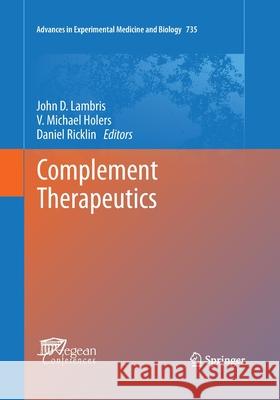Complement Therapeutics » książka



Complement Therapeutics
ISBN-13: 9781489978233 / Angielski / Miękka / 2016 / 320 str.
Complement Therapeutics
ISBN-13: 9781489978233 / Angielski / Miękka / 2016 / 320 str.
(netto: 575,06 VAT: 5%)
Najniższa cena z 30 dni: 578,30
ok. 16-18 dni roboczych.
Darmowa dostawa!
Following on the Aegean Conference on Complement Therapeutics, this book offers expert focus on contemporary and emerging aspects of complement-mediated disease pathogenesis and the development of therapeutics that modulate this system in a beneficial manner.
Progress and Trends in Complement Therapeutics.- Inhibition of the serine proteases of the complement system.- The role of MASP-1/3 in complement activation.- Membrane-bound complement regulatory proteins as biomarkers and potential therapeutic targets for SLE.- DAF as a therapeutic target for steroid hormones: implications for host pathogen interactions.- Targeting gC1qR domains for therapy against infection and inflammation.- The Alternative C5a Receptor Function.- The effects of selective complement- and CD14-inhibition on the E. coli-induced tissue factor mRNA up-regulation, monocyte tissue factor expression and tissue factor functional activity in human whole blood.- CR2-Mediated Targeting of Complement Inhibitors: Bench-to-Bedside Using a Novel Strategy for Site-Specific Complement Modulation.- Paroxysmal nocturnal hemoglobinuria and the complement system: recent insights and novel anti-complement strategies.- Defective Complement Action and Control Defines Disease Pathology for Retinal and Renal Disorders and Provides a Basis for new Therapeutic Approaches.- C3 Glomerulonephritis/CFHR5 Nephropathy is an endemic disease in Cyprus: Clinical and molecular findings in 21 families.- Complement-targeted therapeutics in periodontitis.- Complement system activation in cardiac and skeletal muscle pathology: Friend or foe?.- Innate immunity as orchestrator of bone marrow homing for hematopoietic stem/progenitor cells.- Complement-mediated microvascular injury leads to chronic rejection.- Targeting complement at the time of transplantation.- Evaluation of the blood compatibility of materials, cells and tissues: Basic concepts, test models and practical guidelines.- Non-invasive detection of complement activation through radiologic imaging.- Highly Multiplexed Proteomic Platform for Biomarker Discovery, Diagnostics and Therapeutics.- Complement in Action: A Review of Patent Trends From 1976 through 2011.
Progress and Trends in Complement Therapeutics.- Inhibition of the serine proteases of the complement system.- The role of MASP-1/3 in complement activation.- Membrane-bound complement regulatory proteins as biomarkers and potential therapeutic targets for SLE.- DAF as a therapeutic target for steroid hormones: implications for host pathogen interactions.- Targeting gC1qR domains for therapy against infection and inflammation.- The Alternative C5a Receptor Function.- The effects of selective complement- and CD14-inhibition on the E. coli-induced tissue factor mRNA up-regulation, monocyte tissue factor expression and tissue factor functional activity in human whole blood.- CR2-Mediated Targeting of Complement Inhibitors: Bench-to-Bedside Using a Novel Strategy for Site-Specific Complement Modulation.- Paroxysmal nocturnal hemoglobinuria and the complement system: recent insights and novel anti-complement strategies.- Defective Complement Action and Control Defines Disease Pathology for Retinal and Renal Disorders and Provides a Basis for new Therapeutic Approaches.- C3 Glomerulonephritis/CFHR5 Nephropathy is an endemic disease in Cyprus: Clinical and molecular findings in 21 families.- Complement-targeted therapeutics in periodontitis.- Complement system activation in cardiac and skeletal muscle pathology: Friend or foe?.- Innate immunity as orchestrator of bone marrow homing for hematopoietic stem/progenitor cells.- Complement-mediated microvascular injury leads to chronic rejection.- Targeting complement at the time of transplantation.- Evaluation of the blood compatibility of materials, cells and tissues: Basic concepts, test models and practical guidelines.- Highly Multiplexed Proteomic Platform for Biomarker Discovery, Diagnostics and Therapeutics.- Complement in Action: A Review of Patent Trends From 1976 through 2011.
This book highlights progress and trends in the rapidly evolving field of complement-related drug discovery and spotlights examples of clinical applications. As an integral part of innate immunity and critical mediator in homeostatic and inflammatory processes, the human complement system has been identified as contributor to a large number of disorders including ocular, cardiovascular, metabolic, autoimmune, and inflammatory diseases as well as in ischemia/reperfusion injury, cancer and sepsis. In addition, complement is often involved in adverse immune reactions to biomaterials, cell and organ transplants or drug delivery systems. Although the complement cascade with its close to 50 extracellular protein targets has long been recognized as an attractive system for therapeutic modulation, the past few years have seen a particularly strong boost in interest. Fueled by novel research insight and the marketing of the first complement-targeted drugs, a plethora of highly creative treatment approaches and potent drug candidates have recently emerged and are currently evaluated in disease models and clinical trials.
The chapters in this book cover a wide range of topics related to the development of complement therapeutics, ranging from the molecular and functional description of complement targets to the presentation of novel inhibitors, improved treatment strategies as well as examples of disease models and clinical applications. The broad and up-to-date overview on a highly versatile and dynamic field renders this book an indispensable source of information for researchers and clinicians dealing with therapeutic and disease-related aspects of the human complement system.
1997-2026 DolnySlask.com Agencja Internetowa
KrainaKsiazek.PL - Księgarnia Internetowa









